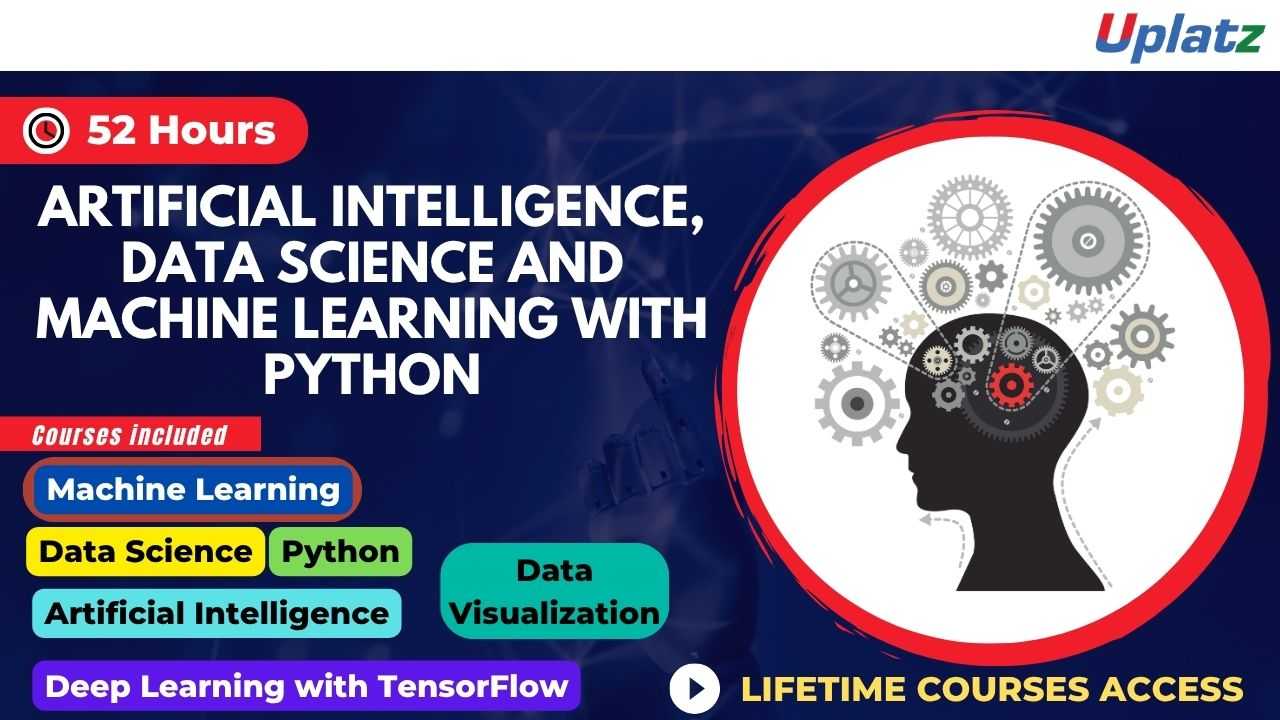Career Path - AI Product Owner
Master AI Product Strategy, Development, and Lifecycle Management in Cross-Functional EnvironmentsPreview Career Path - AI Product Owner course
Price Match Guarantee Full Lifetime Access Access on any Device Technical Support Secure Checkout Course Completion Certificate 92% Started a new career
BUY THIS COURSE (
92% Started a new career
BUY THIS COURSE (GBP 32 GBP 99 )-
 87% Got a pay increase and promotion
87% Got a pay increase and promotion
Students also bought -
-

- Artificial Intelligence, Data Science, and Machine Learning with Python
- 52 Hours
- GBP 12
- 5867 Learners
-

- Data Visualization in Python
- 23 Hours
- GBP 12
- 558 Learners
-

- Career Path - Data Science Manager
- 400 Hours
- GBP 32
- 966 Learners

Career Path - AI Product Owner (Self-Paced Online Course)
Artificial Intelligence is revolutionizing how businesses operate, make decisions, and create value. As organizations increasingly integrate AI into their products and services, the demand for professionals who can effectively bridge the gap between technical teams and business strategy is growing rapidly. Enter the AI Product Owner—a crucial role that ensures AI solutions are not only technically sound but also aligned with customer needs and organizational goals.
Uplatz’s Career Path – AI Product Owner is a comprehensive self-paced online course tailored for aspiring professionals seeking to step into this high-impact role. With expertly crafted video modules, real-world case studies, and practical frameworks, this course helps you build the essential skills needed to lead AI-powered product development from vision to deployment.
What Makes This Course Unique?
The role of an AI Product Owner combines business acumen, technical fluency, and agile leadership. This course addresses each of these dimensions through a well-structured, self-paced learning experience. You'll learn how to identify business opportunities for AI, work with cross-functional teams using tools like JIRA and Confluence, and communicate effectively with data scientists, engineers, and stakeholders.
Unlike traditional product management courses that focus on general principles, this program is purpose-built to explore the unique challenges and workflows of managing AI-based solutions. You'll gain fluency in AI fundamentals, lifecycle management, stakeholder communication, ethical considerations, and data fluency—all essential to owning the product vision in an AI context.
Who Should Take This Course?
The AI Product Owner course is ideal for:
- Aspiring Product Owners or Product Managers who want to specialize in AI and machine learning
- Technical professionals (developers, data analysts, engineers) looking to transition into product ownership
- Business analysts and strategists aiming to take on more product-driven responsibilities
- Scrum Masters and Agile practitioners interested in deepening their understanding of AI in product development
- Entrepreneurs and innovators building AI-based solutions and digital products
Whether you're from a tech, business, or data background, this course provides the holistic skill set required to succeed in modern product teams working on AI-enabled platforms.
What You Will Learn
The course is designed to give you end-to-end exposure to the lifecycle of AI product development. You’ll learn how to:
- Define and communicate a compelling product vision for AI-based solutions
- Collaborate with engineering and data science teams during model development, training, and evaluation
- Work within Agile frameworks using tools like JIRA and Confluence for backlog management, sprint planning, and team coordination
- Interpret and use data for decision-making through foundational skills in SQL, Python, and R
- Ensure products meet ethical, legal, and user-experience standards while scaling AI capabilities
- Align AI capabilities with real customer pain points and deliver meaningful business outcomes
By the end of the course, you’ll be ready to take ownership of AI projects, navigate the complexities of cross-functional collaboration, and contribute confidently to digital transformation initiatives.
How to Use This Course Effectively
To maximize the value of this self-paced course, it's important to take an intentional, structured approach to your learning. Here’s how you can get the most from this program:
1. Set Clear Career Goals
Before starting, define what you hope to achieve. Are you looking to switch careers into AI product roles, or are you upskilling for your current position? Do you want to launch an AI product or improve stakeholder communication in your tech team? Your goals will help you navigate the course more strategically.
2. Establish a Learning Routine
One of the biggest advantages of a self-paced course is flexibility, but consistency is the key to completion and success. Block out regular time each week—whether it's 30 minutes a day or longer sessions on the weekend—to focus on the modules and assignments. Avoid rushing. Allow time for review and reflection.
3. Actively Take Notes and Reflect
As you go through each module, take detailed notes. Write down not only definitions and concepts but also your thoughts on how each idea applies to your current or desired role. Jot down challenges you face at work or in projects that relate to what you’re learning.
4. Engage with Real-World Use Cases
This course includes case studies and practical examples drawn from real industry scenarios. Use these opportunities to understand how theoretical concepts apply to actual AI product lifecycles. Try to draw parallels with your own experiences or hypothetical situations relevant to your domain.
5. Practice with Tools and Frameworks
This course introduces essential tools like JIRA, Confluence, SQL, and basic data analysis in Python/R. Don’t just watch the videos—open the tools, explore the interfaces, write your own queries or user stories, and test features. Apply what you learn to build your confidence and hands-on experience.
6. Work on a Capstone Project or Simulated Scenario
As you progress, try to create a mock AI product proposal or backlog. Define user personas, write epics and user stories, outline acceptance criteria, and map out the AI model’s input-output behavior. This type of project will help consolidate your knowledge and can also serve as a portfolio piece.
7. Revisit and Revise
AI product development is complex, and some concepts may require a second or third review. With lifetime access to the course, you can revisit lessons anytime you want to refresh your knowledge or dig deeper into specific topics. Bookmark sections that are most relevant to your goals.
8. Build a Personal Playbook
As you move through the modules, start creating your own “AI Product Owner Playbook.” Include templates, key learnings, decision-making frameworks, sprint planning tips, and stakeholder management strategies. This document will become your go-to guide in your next role or project.
A Launchpad for Your AI Product Career
The Career Path – AI Product Owner course is more than just a learning program—it’s a professional accelerator. It prepares you not just to understand AI, but to own the responsibility of delivering AI-powered solutions that are ethical, scalable, and impactful.
As organizations continue to adopt intelligent technologies, the demand for skilled AI Product Owners will only grow. By completing this course, you position yourself at the forefront of this digital evolution—with the knowledge, confidence, and tools to lead product innovation in AI-driven companies.
Take control of your career. Enroll now and become the AI Product Owner your future team is waiting for.
Course/Topic - Course access through Google Drive
-
Google Drive
-
Google Drive
By the end of this course, learners will be able to:
- Understand the role and responsibilities of an AI Product Owner in modern enterprises.
- Learn to define, validate, and manage AI product requirements and roadmaps.
- Gain foundational knowledge of AI and machine learning concepts relevant to product strategy.
- Coordinate with cross-functional teams including data scientists, engineers, and business stakeholders.
- Explore tools like JIRA, Confluence, SQL, and basics of Python/R for managing AI products.
- Learn to manage the product lifecycle in AI environments including model training, deployment, and monitoring.
- Understand ethical AI practices, regulations, and risk mitigation strategies.
- Prepare for interviews and certifications relevant to AI product management roles.
Syllabus:
- Introduction to AI Product Ownership
- Role of AI Product Owner
- Importance in AI-driven organizations
- Foundations of Artificial Intelligence
- Key AI and ML concepts
- AI lifecycle and use cases
- AI Product Strategy & Roadmap Planning
- Defining vision and goals
- Market research and user needs
- Creating AI product roadmaps
- Working with AI Teams
- Collaborating with data scientists and ML engineers
- Aligning technical feasibility with business value
- Tools for AI Product Owners
- Using JIRA, Confluence for product planning
- Intro to SQL, Python/R for data insights
- AI Ethics, Compliance & Risk Management
- Fairness, transparency, explainability
- Navigating AI regulations and governance
- Metrics & Performance Tracking for AI Products
- KPIs for AI products
- Monitoring and iteration strategies
- Real-World Use Cases & Case Studies
- AI in healthcare, fintech, retail, and more
- Product ownership success stories
- Career Growth and Certification Preparation
- Career paths in AI product management
- Resume building and interview preparation
Upon successful completion of the course, learners will receive a Course Completion Certificate recognizing their knowledge in AI product strategy and development.
This certification demonstrates your expertise in bridging AI technology and business value and is a strong credential for product management and AI leadership roles. It adds weight to your resume and supports your career growth, especially when transitioning into AI product roles or seeking advancement within a current organization.
Additionally, the course lays the groundwork for preparing for industry-recognized certifications like Certified Scrum Product Owner (CSPO), Product Manager AI Certification, or other related professional programs in AI product leadership.
The AI Product Owner role is among the fastest-growing roles in tech, offering a unique combination of AI domain knowledge and product management expertise. As AI adoption accelerates, organizations are looking for professionals who can lead the development of AI-powered solutions from concept to deployment.
After completing this course, you can pursue roles such as:
- AI Product Owner
- Technical Product Manager – AI/ML
- Product Manager – Data & AI
- AI Strategy Consultant
- AI Innovation Lead
Industries such as finance, healthcare, e-commerce, automotive, and enterprise tech are actively hiring AI Product Owners to drive innovation and product excellence. There are also significant opportunities in startups, consulting firms, and AI R&D labs.
With experience, professionals can advance to positions like:
- Head of AI Products
- Chief Product Officer (CPO)
- Director of AI Strategy
- VP of Product Management
This course opens a pathway to becoming a strategic leader in the AI ecosystem.
1. What is the role of an AI Product Owner?
An AI Product Owner defines the vision for AI products, manages backlogs, aligns stakeholders, and ensures delivery of valuable AI-driven features.
2. How do you differentiate between traditional and AI product development?
AI product development involves experimentation, data dependency, model training, and performance monitoring, unlike traditional deterministic software.
3. What are some key metrics to track for an AI product?
Metrics may include model accuracy, precision/recall, user engagement, business KPIs, and model drift over time.
4. How do you manage stakeholders in AI projects?
By aligning on business value, managing expectations, translating technical insights into business language, and maintaining transparency through the lifecycle.
5. What tools do AI Product Owners commonly use?
JIRA, Confluence for planning; SQL, Python/R for data access; and collaboration tools like Slack, Miro, and product analytics platforms.
6. How do you prioritize features in an AI product backlog?
Using frameworks like RICE or MoSCoW, along with business impact, feasibility, data readiness, and ethical considerations.
7. What is the role of ethics in AI product development?
Ensuring fairness, avoiding bias, complying with regulations, and protecting user data are essential ethical responsibilities.
8. What challenges arise in deploying AI models to production?
Challenges include data drift, model explainability, integration issues, and monitoring for performance degradation.
9. How do you collaborate with data scientists as a product owner?
By defining business problems clearly, ensuring data availability, and iteratively reviewing model outputs and performance.
10. What are some real-world examples of AI product success?
AI-based fraud detection in finance, chatbots in customer service, predictive maintenance in manufacturing, and personalized recommendations in e-commerce.









